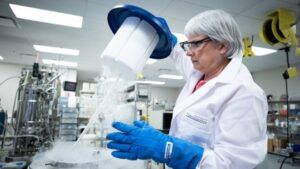
Theradaptive received $7.4 million from DoD to start clinical trials of its OsteoAdapt regenerative therapeutic product for spine and trauma repair. Source: Theradaptive
FREDERICK, MD — In September, the Department of Defense granted a small Maryland-based company up to $7.4 million to develop a targeted therapeutic that could have a big impact on the care of military personnel and veterans with orthopedic injuries and degenerative diseases.
Theradaptive Inc. CEO and Founder Luis M. Alverez, PhD, started the business to address a question of keen importance to the DoD: Why do so many servicemembers undergo amputations weeks or months after sustaining combat-related injuries?
Alvarez had personal reasons for asking the question. During his own deployment to Iraq, an improvised explosive device hit his HMMWV (Humvee) and severed the arm of the gunner. Later, he saw many other cases where limbs were initially saved but ultimately required amputation because they failed to heal. That prompted him to persuade the Army to send him to MIT for a doctorate in biological engineering, where he researched bone and tissue regeneration.
Ultimately, Alvarez served as the Deputy Director of the Armed Forces Institute of Regenerative Medicine and, upon retiring as a lieutenant colonel, licensed the tissue repair technology he developed from MIT and established Theradaptive. The DoD has been supportive from the start, providing the initial funding in 2017 and a total of $24 million to date.
The latest funding, a Clinical Trial Award (CTA), is designed to help Theradaptive to scale up production of its OsteoAdapt regenerative product and, once it receives U.S. Food and Drug Administration approval to begin clinical trials, to launch its phase I/II studies. The technology has already received three breakthrough device designations, which accelerate the approval process. It expects to initiate the trials in early 2024.
The award “comes at a pivotal time for our company as we prepare for first-in-human clinical trials,” Alvarez said. “Veterans and servicemembers are disproportionally likely to suffer from traumatic extremity injuries or spinal degeneration and disc injury, and currently lack efficacious treatments with very few options. We have already demonstrated superior outcomes in preclinical studies, showing the promise of our technology.”
Improved Therapies
“With this CTA award we are one step closer to providing new and improved therapies to patients and aligning with [Congressionally Directed Medical Research Program]’s strategic goal of trying to increase post-injury quality of life by halting or slowing orthopedic disease progression in servicemembers and veterans.”
Theradaptive developed a protein-engineering platform that produces targeted therapeutics designed to be used to coat implants, devices and injectables. Once in the body, the therapeutics promote precise and persistent tissue regeneration. Rather than implant a bare bone void filler and hoping the scaffold makes bone repair and growth easier, for instance, Theradaptive’s system fuses osteogenic proteins that can coat implants to induce bone growth directly.
That stands in notable contrast to current systems, which may deliver potent biologics to the proper location, but have difficulty retaining them in that spot for any extended period of time. Alternatively, regenerative proteins are delivered systemically, diluting their effectiveness or requiring high doses with adverse effects.
As the company puts it, “devices are ill-suited to deliver biologics and biologics are ill-suited for targeted delivery. Our work bridges this divide. With our platform, we can turn virtually any implant into a biologic delivery device—effectively a ‘biodevice.’”
So far, the technology, Osteoadapt SP, has received breakthrough device designation for spinal fusion, transforaminal interbody and posterolateral fusion. Together, those indications address more than 90% of lumbar spinal fusion procedures.
In keeping with Alvarez’s initial motivation, the company’s pipeline also includes products for long-bone and osteochondral repair.
Theradaptive’s platform creates material-binding variants of recombinant proteins optimized for coating devices. Simply administering native proteins may not target the right cells and could have adverse effects on unintentionally affected tissues. By using a combination of computational and in vitro methods, Theradaptive discovers variants best suited to device delivery with high binding potential.
For example, its AMP2 is a proprietary variant on the bone morphogenetic protein 2 (BMP2) that binds tightly to devices. BMP2 is a natural component in bone-healing used today to support bone formation.
“BMP2 is a very powerful protein that drives bone formation in the body,” said Alvarez. “Of course, it’s a double-edged sword, because if you don’t have a way to deliver it, you can have very negative side effects. With AMP2, bone will only form where the implant is. It’s a beautiful way to control the delivery.”
“Theradaptive is addressing significant unmet needs with their regenerative therapeutics, and this award shows the U.S. Government resolutely recognizes this,” said Brett Freedman, MD, orthopedic surgeon and head of Spine Surgery at Mayo Clinic. “The company’s game-changing treatments are enhancing therapeutic performance and providing patients with more effective solutions. Their safe and precise therapeutic delivery platform promises to revolutionize the orthopedics industry and make a significant positive impact to millions of lives.”

